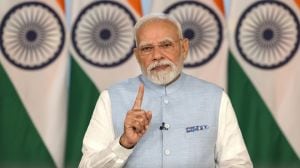Manchester drug disgrace: Govt knew there was suspect in team
Finally, the word is officially out on what had been whispered in private: Krishnan Madasamy, the Indian weightlifter who won gold at the Co...

Finally, the word is officially out on what had been whispered in private: Krishnan Madasamy, the Indian weightlifter who won gold at the Commonwealth Games but was stripped of his medals after testing positive for banned drugs, had also tested positive shortly before he left India.
And, though officials knew there was a positive sample, they now claim they weren’t aware whose sample it was because it didn’t have a label.
Admitting this to The Indian Express, Shekhar Dutt, Director-General of the Sports Authority of India — the body in charge of the testing — said: ‘‘Unfortunately, Madasamy’s sample did not have a label on it. He was cleared (for the Games) on the basis of his earlier, clean sample tests.’’
This, he said, is the finding of the inquiry committee set up by former sports minister Uma Bharti, the report on which is being sent to her successor Vikram Verma.
Once it was aware of a positive sample, SAI should ideally have had all the suspects re-tested and weeded out the guilty athlete. Possibly a laborious exercise but one that would have prevented embarrassment abroad.
Instead, Madasamy went to the Games, won and lost the medals and now has to sit out for two years from the sport — and misses the next Commonwealth Games too. Madasamy tested positive for Nandrolone, an anabolic steroid that has also been detected in samples of sprinters Linford Christie and Merlene Ottey.
The suspicion that officials knew more about Madasamy’s condition than they are willing to let on is strengthened by the fact that, while five weightlifters faced two tests each (on June 10 and July 9), only Madasamy was called for a third, on June 21. It’s not yet known which test result went unlabelled.
Madasamy himself has been silent on the issue since returning from the Games, except to say that he had been taking the same food substances as ‘‘everyone else’’ was.
Interestingly, in a letter to Verma, dated August 28, Indian Olympic Association (IOA) president Suresh Kalmadi levelled the same charge: that Madasamy tested positive even before he went to Manchester. Kalmadi also said that the sample of Satheesha Rai, the other medal-winner who tested positive, was ‘‘either lost in Bangalore or at the SAI laboratory at Delhi.’’
Kalmadi quoted chief coach Tamil Selvan, who accompanied the team to Manchester, as saying that he’d been informed by a team of SAI officials investigating the issue that Madasamy’s analysis reports were positive. ‘‘Unfortunately, no information — formal or informal — was given to the coach or to the ad-hoc committee of the Indian Weightlifting Federation or to the IOA,’’ says the letter.
Incidentally, another doping controversy was averted when Farheen Yasin was withdrawn from participation in the Asia-Pacific Aquatic Championship in China a fortnight ago. Her urine samples had a banned drug and SAI informed the Swimming Federation of India (SFI) in time so that it could pass on the information right on time to its officials accompanying the team in China.
This is precisely the kind of alert the Weightlifting Federation of India has referred to in its letter to the IOA, which Kalmadi has attached with his letter to Verma.
When the news of the bans broke, Uma Bharti said punitive action would be taken against erring officials. So far, the only direct fallout has been the suspension of Manilal, a junior scientific officer at SAI Centre, Bangalore, who was also the weightlifters’ coach during the Bangalore camp.
Photos





- 01
- 02
- 03
- 04
- 05

























